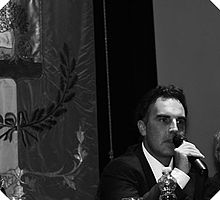
Benedetto Croce, KOCI, COSML was an Italian idealist philosopher, historian, and politician who wrote on numerous topics, including philosophy, history, historiography, and aesthetics. A political liberal in most regards, he formulated a distinction between liberalism and "liberism". Croce had considerable influence on other Italian intellectuals, from Marxists to Italian fascists, such as Antonio Gramsci and Giovanni Gentile, respectively.

Alvito is a town and comune in central Italy, in the province of Frosinone, south of Rome in the Lazio region. Its territory is included in the Abruzzo, Lazio and Molise National Park.
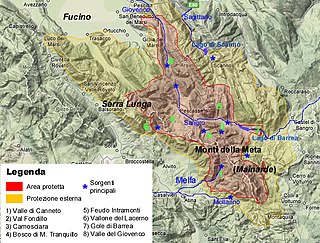
Abruzzo, Lazio and Molise National Park is an Italian national park established in 1923. The majority of the park is located in the Abruzzo region, with smaller parts in Lazio and Molise. It is sometimes called by its former name Abruzzo National Park. The park headquarters are in Pescasseroli in the Province of L'Aquila. The park's area is 496.80 km2 (191.82 sq mi).

Pescasseroli is a town and comune in the province of L'Aquila, in Southern Abruzzo, central Italy.

Ciociaria is the name commnly used, in modern times, for some impoverished territories southeast of Rome, without defined geographical limits. Starting from the Fascist period and the creation of the province of Frosinone, the same name was arbitrarily imposed by the local fascist organizations and then misused by the local press, by promotional associations and folkloristic events as a synonym for Frosinone and all the popular traditions of its territory. The local dialect is referred to as campanino in old literature. It is merely a local variants of Central-Italian Latian but is improperly indicated as "ciociaro dialect", although the linguistic and scientific definition is Central-Northern Latian. In more recent times, the term Campagna Romana, or Roman Campagna, a favorite subject of countless painters from all over Europe, has referred to the adjoining region to the north of Ciociaria, but part of the Province of Rome.
The Giardino Botanico e Arboreto Appenninico del Parco Nazionale d'Abruzzo is a botanical garden and arboretum located in the Parco Nazionale d'Abruzzo, Lazio e Molise at via Santa Lucia, 67032 Pescasseroli, Province of L'Aquila, Abruzzo, Italy.

Giustino Fortunato was an Italian historian and politician.
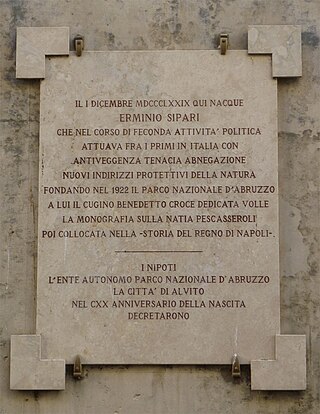
Erminio Sipari was an Italian politician and naturalist, author of studies on the preservation of nature and founder of Parco Nazionale d'Abruzzo, which he chaired from 1922 to 1933.
Giovanni Battista Valentini, (Cantalicio), was an Italian humanist, author and Catholic bishop.
Attilio Celant, 2nd Class / Grand Officer of the Order of Merit of the Italian Republic, is an Italian economist, geographer and academic.
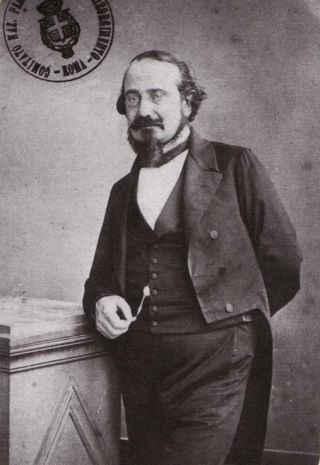
Bertrando Spaventa was a leading Italian philosopher of the 19th century whose ideas had an important influence on the changes that took place during the unification of Italy and on philosophical thought in the 20th century.

Silvio Spaventa was an Italian journalist, politician and statesman who played a leading role in the unification of Italy, and subsequently held important positions within the newly formed Italian state.
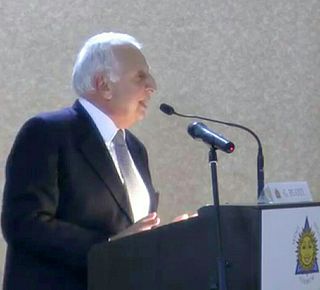
Giovanni Puoti is an Italian Rector, politician, and Professor of Tax law.
Pietro Romualdo Pirotta was an Italian professor of botany. He was made Knight of the Crown of Italy.
DeepCon is an Italian science fiction, fantasy and horror fan convention, covering multiple entertainment forms and media, mixed with a dose of actual, real-world science.
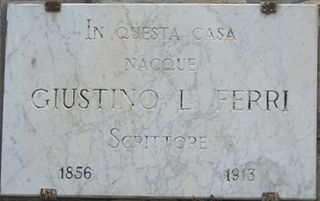
Giustino Lorenzo Ferri was an Italian journalist and writer.
Vincenzo Eugenio Balzano was an Italian magistrate, an art historian and a scholar of the history of Abruzzo and Molise.
Achille Graziani was an Italian archaeologist.
